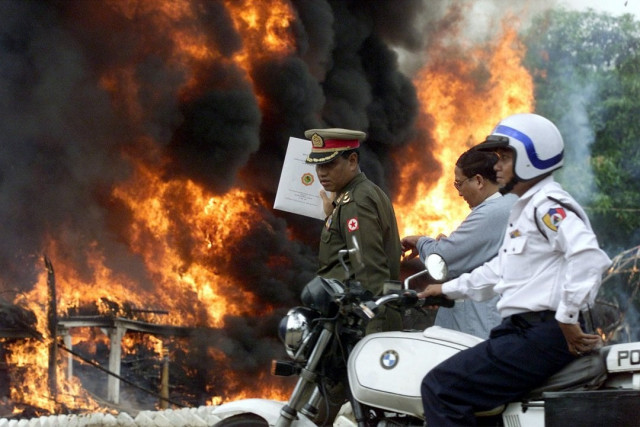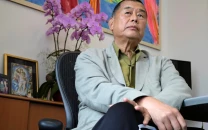Myanmar torches drugs worth nearly $60 million
Myanmar world's second biggest producer of opium

A policeman rides past officials as a huge fire engulfs illicit drugs at a destruction ceremony conducted by Myanmar's government in Yangon.PHOTO: REUTERS
The impoverished nation remains the world's second biggest producer of opium from which heroin is made, according to the United Nations.
Decades of corrupt military rule and continuing civil wars with ethnic rebels are blamed for fuelling the drugs trade.
Heroin use at 20-year high in U.S. drug "epidemic", U.N. says
To mark the UN's annual anti-drugs day, seized drugs and precursor chemicals were burnt in three places across Myanmar.
Over half a ton of opium and 80 kilogrammes (176 pounds) of heroin was torched along with 768 kg of methamphetamines and 10 million other stimulant pills, a police official told AFP, adding the haul was worth around $57 million.
At a ceremony in the capital Naypyidaw, Vice-President Myint Swe conceded the battle to stem drug production was far from being won.
"People in very remote rural areas are trafficking drugs and cultivating poppies for a living," he said urging greater development for the poor and conflict-hit border areas.
Drugs are the real weapon of mass destruction
"Once we have development and success in the local peace process, our drugs control process will strengthen."
The government led by Aung San Suu Kyi's pro-democracy party has a massive popular mandate following elections in November.
She has promised efforts to end several simmering insurgencies.
But the government's writ currently does not extend to many border areas where drug production is rampant.
Both rebels and the Myanmar army are accused of buying weapons with drugs produced in the so-called Golden Triangle, a zone around the intersection of Myanmar, Thailand and Laos.
ANF recovers 20kg of heroin, 6kg hasish during raid in Karachi
While the heroin trade is worth billions of dollars to cross-border narcotics syndicates, opium farmers scratch a living at the bottom of the drug chain.
A report released by the United Nations Office on Drugs and Crime said farmers in Myanmar's poppy-growing villages make less money than other rural communities.
The struggle by villagers to make ends meet rather than greed was prompting the illicit cultivation, it added.
According to the UN, global opium production plunged almost 40 percent last year but the drug remains easily accessible due to a supply glut.
Asia remains the world's largest market for opiates, accounting for an estimated two thirds of all users, with Myanmar producing 14 percent of the world's opium.


















COMMENTS
Comments are moderated and generally will be posted if they are on-topic and not abusive.
For more information, please see our Comments FAQ